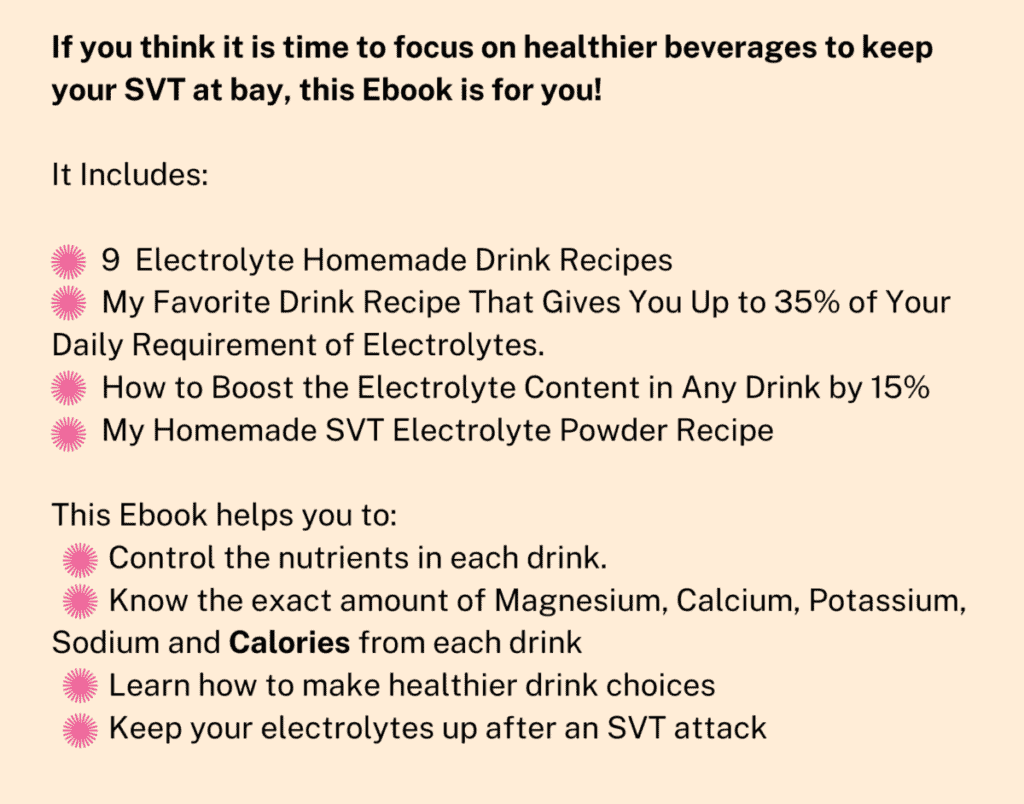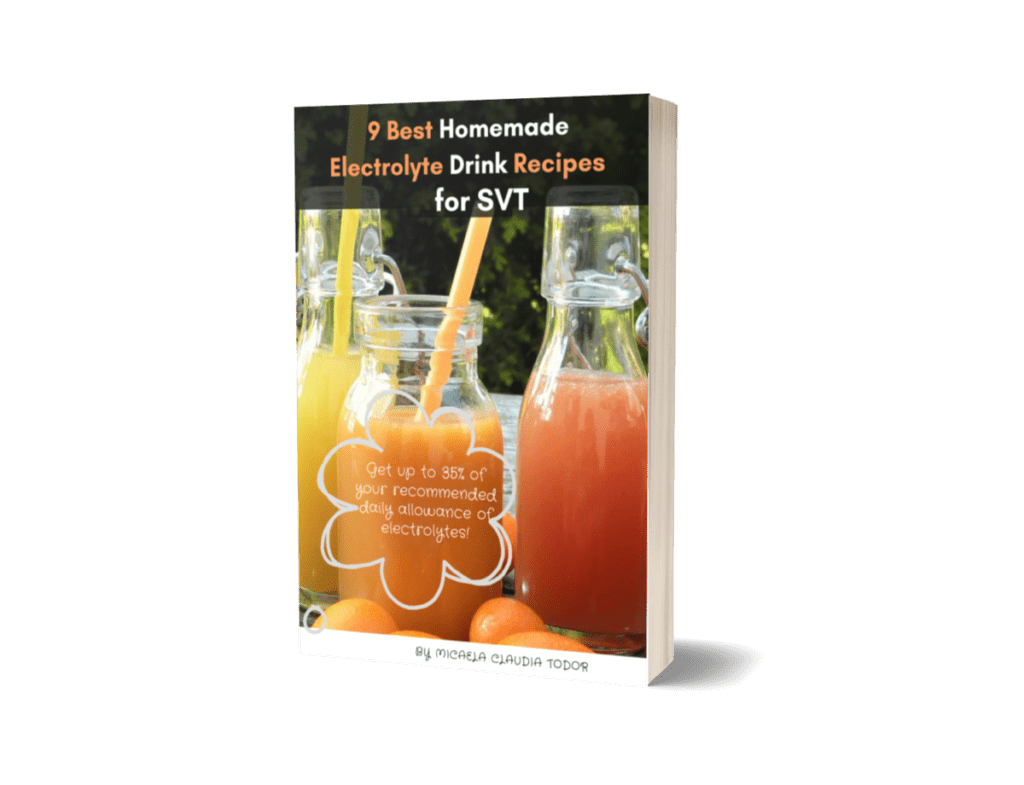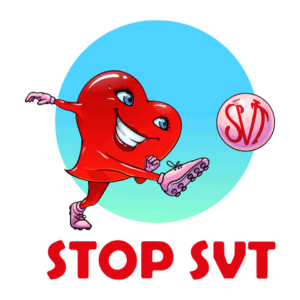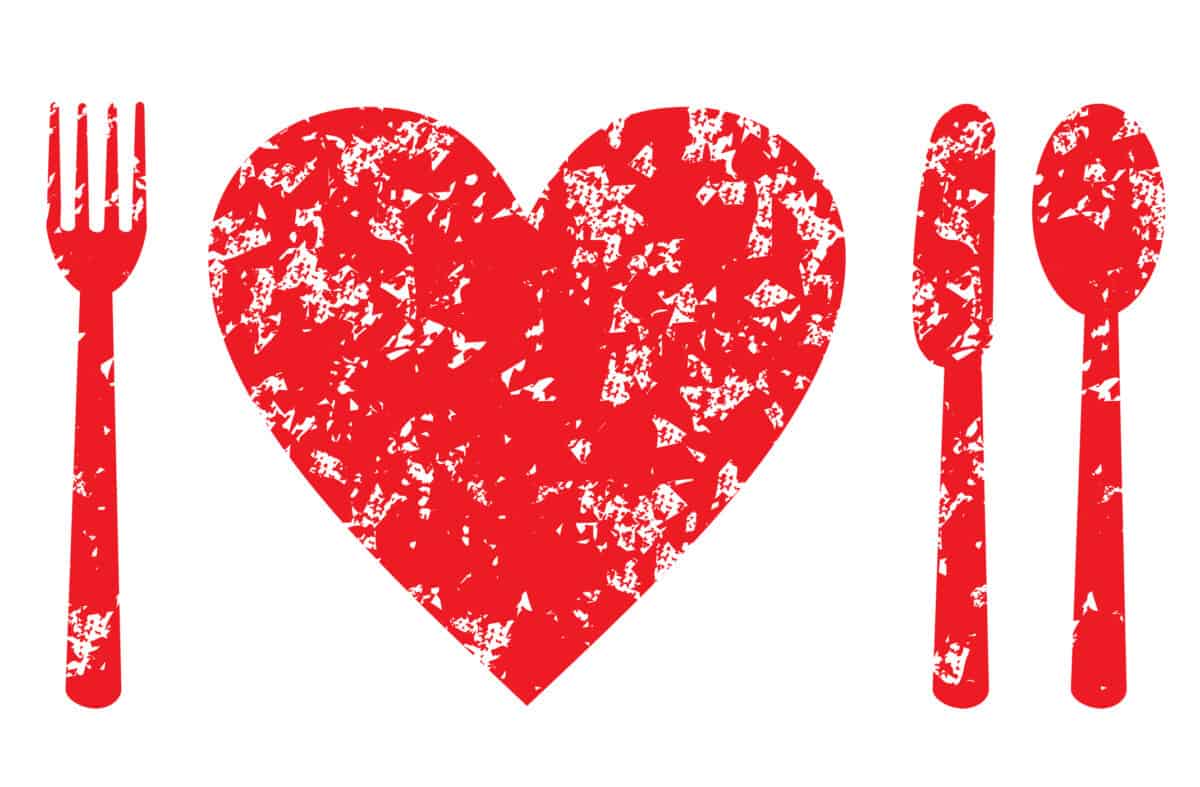As with all persons affected by various conditions, individuals with SVT have to be mindful of their diets to prevent triggering episodes or make the situation worse.
This article will explore some types of foods and eating habits that we must steer clear when we have supraventricular tachycardia and why it is essential to do so.
Table of Contents
Why Food Choice Is Important When You Have SVT?
“Before you heal someone, ask him if he’s willing to give up the things that make him sick.”
― Hippocrates
To keep ourselves healthy and not develop one of the modern diseases, such as diabetes, high blood pressure, autoimmune disorders, etc., we must monitor and be responsible for our food choices.
Food is necessary to keep us healthy, provide us with energy, and assist with other bodily functions like wound healing.
However, when we choose to consume foods that compromise our health, we put ourselves at an increased risk of developing chronic, non-communicable conditions.
Once we develop a second condition, SVT might become a severe problem.
To prevent any complications, we ought to eat healthy, well-balanced diets while avoiding stimulants, for example, caffeine.
Heart and diet are linked. The healthier our hearts, the better we can control SVT.
Research has shown that if we consume a diet rich in green leafy vegetables, we promote heart health. Whole grains are also another good food option, as they are known for their cholesterol-reducing properties.
If we choose to consume unhealthy foods, we will increase the risk to develop heart disease and exacerbate SVT.
Any food that presents a risk for our heart health will be a risk for our SVT.
The factors that determine whether a product is detrimental to our health are the high concentration of sugar, trans fats, salt, and the way it was processed before consumption but also during cooking.
Foods that affect SVT and heart health
I will present four categories of foods that affect heart health and SVT :
⦁ Foods that the cardiologist suggests avoiding after you have been diagnosed with SVT
⦁ Foods that are detrimental to your heart health in general
⦁ Foods that cause allergies
⦁ Foods that, from people’s experience, exacerbate SVT
Foods that the cardiologist suggests avoiding after you have been diagnosed with SVT
Alcohol
Medical professionals have advised against the consumption of alcoholic beverages for persons with SVT due to its proven record for being a trigger of the condition.
A study published by the European Society of Cardiology in April 2017 pointed out that the more alcohol consumed, the higher the likelihood of developing abnormal heart rhythms.
Researchers who studied beer drinkers at the Munich Octoberfest have found that the more alcohol consumed the higher was the likelihood of developing abnormal heart rhythms called cardiac arrhythmias.
European Society of Cardiology
They also noted that the arrhythmias would subside once the participants became sober but emphasized that if a person has, for example, an already diseased heart, then the arrhythmia triggered by the alcohol could persist afterward.



Coffee and its derivatives
I draw attention to all the calories added to coffee through various syrups, sugar, milk, whipped cream, etc.
Not only can the sugar overload send blood glucose soaring, but the caffeine may also increase your blood pressure levels, which creates a combination that is conducive to the development of diabetes and heart disease.
Switching to decaf may not even make a significant difference since even decaf coffee has a percentage of 5-30 % caffeine.
In many studies carried out, the results showed increases in the blood pressure and heart rate after having coffee.
Researchers and medical professionals alike have concluded that even at a moderate intake level, coffee and its byproducts will undoubtedly increase the speed and force at which the heart pumps, thereby affecting the heart rate, which can trigger an SVT episode.
I wrote a whole article about the coffee impact on SVT based on four studies. If you want to know what the science says about coffee and SVT, ectopics and arrhythmia, you can read my article here.
Avoid foods that cause an increase in heart rate even if it is a mild change.
Such foods include coffee, teas, chocolate with caffeine, energy drinks, and so many more.
Persons can also endure cardiac issues, such as heart palpitations, after having these products.
Even though these effects may pass quickly, medical professionals have warned that persons with underlying cardiac conditions can suffer more significant consequences that may be fatal.
According to a study published in November 2018 in the Nutrients journal, coffee and beverages containing caffeine can cause a wide range of side effects.
“In summary, FBDG (Food-Based Dietary Guidelines) provide an unfavorable view of caffeinated-beverages by noting their potential adverse/unknown effects on special populations as well as their diuretic, psycho-stimulating, and nutrient inhibitory properties.”
Celine Marie Reyes, Department of Preventive Medicine, Northwestern University Feinberg School of Medicine, Chicago
If you still haven’t made a decision about coffee, I invite you to read the article I wrote, entitled “17 Reasons Why Coffee Makes Your SVT Worse.”
Chocolate
Health specialists are said chocolate is a trigger of SVT because it contains caffeine and theobromine.
Theobromine is a compound that exists naturally in various plants and acts somewhat like caffeine in the body.
In a case study, a female patient, age 53, with no significant medical history, showed up to a medical facility with complaints of palpitations and shortness of breath after consuming large amounts of chocolate.
Electrocardiograms showed supraventricular tachycardia (SVT) at 165 beats per minute.
Stimulants
Anything that contains stimulants is to be avoided by persons affected by SVT.
Stimulants include but are not limited to caffeine, alcohol, some medications, illicit drugs, and smoking.
These choices will bring you a familiar feeling of racing and thumping heartbeats.
Continuously exposing yourself to stimulants might aggravate SVT episodes. We don’t want to go down to the pathway of weakening the heart muscle.
Foods that are detrimental to your heart health
Avoid foods that present a risk of cardiovascular disease and cause inflammation.
In most cases, cardiovascular diseases are not congenital; instead, they are preventative, non-communicable diseases.
Most cardiovascular conditions result from narrowed arteries. Narrowed arteries are a common side effect of consuming a diet low in nutrients and vegetables but high in processed foods, meat, and dairy.
While we cannot control certain risk factors like age and ethnicity, we can regulate our diet to prevent cardiovascular illnesses.
It is recommended that foods, such as those high in saturated fats, trans fat, salt, and other substances, be avoided.
Having narrowed arteries, especially with other cardiac conditions, is a recipe for disaster. It puts us at risk for aggravating our SVT due to the blood flow restriction.
Science proved that inflammation triggers SVT. You can read my article about the proven link showed by studies between inflammation and SVT.
Eating processed foods will cause inflammation, so I see it in our best interest to cut processed foods from our diets as best as we can.
Some of these products include sugary foods such as drinks, pastries, and cereals; they tend to comprise many unhealthy fats known to facilitate inflammation.
It is wise to eat a diet full of anti-inflammatory foods, such as whole fruits, veggies, grains, and beans, to counterbalance inflammation in your body to mitigate episodes.
Deep-fried foods
Studies have revealed that consuming fried foods significantly increases the risk of heart failure.
The pleasant taste of fried foods is due to the fats absorbed during frying. The changes that take place in the course of this process will affect heart health.
While frying, the food will lose water and soak the oil, thus increasing its caloric value.
Also, unsaturated fats will turn into saturated and trans fats. Foods such as vegetables that are high in water and low in fat will absorb more oil when fried, and therefore the consumption of trans fats will be higher. Watch out for french fries or chips.
Premade meals from supermarkets
They are often as unhealthy as eating out at a fast-food joint.
Most pre-made meals are unfortunately not balanced meals, and so they have either too much starch, fat, protein, or too little.
Neither of these options is good for the body and the heart. A lot of the portions are too big, which is a recipe for double trouble.
Pre-packed food
Avoid foods that lack nutrients or depletes your body of nutrients.
Such foods are like those that are termed as “empty calorie” foods.
The majority of the prepackaged goods can fall into this category, and they have little to no nutritional value.
They instead filled the body with mainly solid fats and added sugars, leading to weight gain, several illnesses, and nutritional deficiencies. Opt to consume natural foods like fresh or dried foods, vegetables, whole grains, and legumes
Red meat
Meats such as beef and lamb are classified as red meats. You have heard many times that eating red meat increases the risk of heart disease.
Among the many factors that make this possible, including the concentration of nitrites, cholesterol, and saturated fats, found in red meat, I will draw attention to a single factor: TMAO or trimethylamine N-oxide.
It occurs in the intestine during digestion in people who eat meat, but TMAO values are higher in those who eat red meat.
When TMAO is found in large amounts in the blood, it will prevent the elimination of excess cholesterol and contribute to atherosclerosis formation.
Fast food
Fast-food is terrible because most of them contain MSG, capable of triggering heart palpitations.
Medical professionals have also identified the fact that junk food consumption is associated with premature heart disease.
The understanding among healthcare specialists is that the link between the two is based on the saturated fats in these foods, increasing obesity, diabetes, high cholesterol risk, and the high salt content raising blood pressure.
The worrying effects of fast food on health and their strategic franchise locations have led researchers to recommend that policymakers should consider limiting the number of fast-food joints per community.
Processed and cured meat
Ham, sausages, and luncheon meat are three common examples of processed meats linked to heart disease development and obesity.
These meats are usually a go-to option because they are affordable, convenient, and tasty choices.
However, processed meats have been found to have significant endotoxin levels associated with chronic inflammation development.
What has been discovered is that these toxins, even though the bacteria that produced them are dead, cannot be destroyed by roasting, frying, or boiling the meat, not even by the high hydrochloric acid level in the stomach.
More than that, they will cause inflammation within the body. Eating meat with a high concentration of endotoxins such as processed and cured meat will increase systemic inflammation, leading to atherosclerosis.
Jams, jellies, and sweet spreads
Jam and jelly is a double-whammy for people with diabetes. The sugar that is spread onto another refined carbohydrate like bread or crackers is usually devoid of all nutrition.
It is just a way of adding more sugar to something that already contains sugar. Consuming too much of them may lead to weight gain, heart disease, chronic illnesses.
They irritate the heart, promoting low-grade systemic inflammation, which can cause SVT.
Sugary drinks
Heart disease is the leading cause of death in the United States, and a major contributing factor is a poor diet.
While many people are aware of the negative effects of consuming too much saturated fat and sodium, fewer realize just how harmful sweetened beverages can be for heart health.
Drinking a can of soda, for example, can easily exceed the recommended daily limit of added sugar.
Excess sugar consumption has been linked to weight gain and an increased risk of chronic diseases such as diabetes, heart disease, and certain types of cancers.
The sugar in sweet drinks can cause a spike in blood sugar levels, leading to an increase in heart rate. The body responds to this by releasing insulin, which causes the blood sugar to drop quickly and can lead to a feeling of fatigue and weakness.
Sweet beverages also often contain empty calories, providing little to no nutritional value.
Plus, they can displace healthier alternatives like water, teas or fresh juices in our diets.
I wrote an entire article about homemade electrolyte drinks for SVT and you can try 5 Best Homemade Electrolyte Drinks recipes for SVT here.
Flavored instant oatmeal
Rolled oats are heart-protective whole grains. Flavour instant oatmeal, even if perceived as having less nutritional value, is still a whole grain.
The downside is coming from the fact that it is processed, cut into small pieces, and loaded with sugar, artificial flavorings, and preservatives.
What does a healthy breakfast look like if you want to include oats? One of my favorite recipe for breakfast is this plant-based breakfast for people with SVT.
Cereal bars and highly refined grains
Cereal bars are a convenient grab and go food, making them a regular choice for an early-morning shortcut, but it is probably best for you to reconsider this option, especially if you have SVT.
You will find an excessive amount of refined sugar in granola and cereal-based bars.
They are coated in countless grams of syrups to keep them together. After eating these cereal bars, your blood glucose levels will be hitching a ride on the sugar roller coaster resulting in blood vessel damage.
Cereals are made of refined and processed grains. They are bad because of their high sugar content and are highly processed, and all nutrients are removed.
Researchers have found that consuming refined and processed foods regularly is significantly linked to developing diabetes, heart conditions, and obesity. Unfortunately, these foods are still the primary source of carbohydrates in many countries.
Baked foods
Biscuits, crackers, cakes, croissants are typically loaded with sugars, salts, saturated fat, and other processed products, making them a significant threat to the health of our heart.
If you want to have a baked treat once in a while, you make it at home. This way, you can monitor the ingredients and make it as healthy as possible.
You should also exclude baked goods from your regular diet; they can be substituted for things like heart-healthy fruits and vegetables and whole grains.
Margarine
Margarine is a processed food made as a substitute for butter and taste and looks similar to it.
It is a product obtained from partially hydrogenated vegetable oils.
This hydrogenation process allows the transformation of the oil from liquid to solid, resulting in the product we know as margarine.
Hydrogenation of oils gives rise to trans fats that are most harmful to heart health by promoting inflammation and insulin resistance
Dairy products – Cheese
Some types of cheese contain a tyramine substance, an amino acid that can affect blood pressure.
Aged cheese like parmesan and gorgonzola, soy sauce, sauerkraut, and salami are full of tyramine. Consuming a lot of cheese can result in high cholesterol, which increases your risk of cardiovascular disease.
Research has shown that tyramine can cause your blood pressure to rise and lead to heart palpitations at even a moderate level.
Whole-fat dairy products have a bad reputation because they contain high amounts of saturated fat, which raises LDL (“bad”) cholesterol level, a risk factor for heart disease. The extra fat also adds calories to your diet, which may lead to weight gain.
Frozen meals
These are quick, easy, and convenient for the too busy persons to cook from scratch, whether it’s part of the meal or the entire thing.
However, over time, these frozen meals harm our heart and other organs because many of them are not only filled with low-quality nutritionless products. They also contain too much salt, fat, and preservatives to better taste and longer shelf life.
Grapefruit when on prescribed medicine
Grapefruit is not indicated if you are on prescribed medications, such as improving and maintaining cholesterol and blood pressure levels. Grapefruit is contraindicated because it can increase the effects of these drugs in the blood, leading to toxicity, causing many side effects, such as arrhythmia.
MSG, preservatives and flavor enhancers
Foods containing additives such as MSG, sulfite preservatives, and flavor enhancers are linked to heart palpitations and arrhythmias.
A look at hospital admissions cases due to atrial fibrillation in Australia has revealed that the numbers have tripled between 1993 to 2008.
Professionals believe that this is linked to food additives. In an internet forum specifically for atrial fibrillation, 10% listed MSG and 4% listed aspartame as triggers for their attacks.
Foods that cause allergies
Food allergy, also known as food sensitivity, is one factor that can induce heart palpitations and arrhythmias.
A food allergy typically occurs as an adverse reaction to food due to the individual’s immune system.
Allergic reactions usually worsen SVT and other tachycardia-related conditions. The effects of the response can be sustained for a prolonged period.
Also, having repeated episodes will lead to permanent cardiovascular damage. It is best to avoid foods you know or think you may be allergic to.
Foods that from people’s experience, cause SVT
Various foods could act as your triggers, but not everyone’s.
Below are some foods that have caused SVT episodes in some persons, while others have not had such reactions to these same foods. This is because everyone is different. You have to find out what causes your palpitations.
Anecdotal – people say being hungry or not eating enough triggers an episode.
I believe what happens is they do not get enough nutrients for the body to function correctly.
Eating less is increasing life expectancy, but eating less and poorly will negatively affect your health.
Researched evidence shows that eating inadequately causes dehydration and low electrolyte levels, which can trigger palpitations.
Another explanation could be that low blood sugar levels cause palpitations. For a person who has a healthy lifestyle and generally maintains a good diet, blood sugar fluctuation is moderate.
Still, for someone who eats a standard American diet, their blood sugar goes from very high to very low, quickly causing unpleasant symptoms.
For those who have a history of low blood sugar, comparative studies have shown that they are at an increased risk of experiencing palpitations after eating certain foods.
Other individuals say overeating will cause palpitations.
Due to the vagus nerve’s connection with the digestion process, it is normal for the heart rate to increase after eating, as it needs to pump more blood out to help the digestion process.
This is why overeating increases the heart rate and can be so severe that it causes palpitations, which is a severe side effect for SVT persons.
Give your heart time to rest and fewer chances to overwork.
Licorice – some people complain of having palpitations after eating it. It contains glycyrrhizin, which gives the candy to taste sweet. The ingredient is made from the root of licorice. Eating it can cause the kidneys to release too much potassium, disrupting cardiac function, and sometimes causing palpitations.
Gluten – there have been many recorded cases of palpitations due to gluten consumption. However, it has been linked to an allergy to the product. Untreated gluten intolerance causes heart palpitations.
Spicy Mexican food– heartburn is a common side effect of eating spicy foods. In cases of extreme and prolonged heartburn, there can be palpitations.
Garlic– some persons have been able to give experiences of their heart racing after eating garlic-themed foods. It has been theorized that garlic causes heart palpitations when eaten raw and also in high quantity. Consuming it raw causes heartburn that can lead to palpitations.
Habits that contribute to the occurrence of SVT
Oversized portions
Having smaller servings will still add up to the same nutritional value, and on the plus side, it gives your body time to break the meals down, which reduces stress on the heart compared to when digesting larger meals.
Oversized portions also facilitate the consumption of excess food leading to issues like obesity and compromised heart health.
Snacking between meals
This is a habit that we all have, and I imagine it has become a more frequent practice at home because of the pandemic.
The issue with this habit is that it causes us to overeat, and 99 % of the time, we have unhealthy snacks like chips or biscuits.
This will ruin our appetites and load us up with massive amounts of carbs, fats, sugar, and salt by the end of the day.
Fad diet
Excess weight, whether in pounds or inches, most of us struggle with.
Of late, there has been an increased amount of fad diets (a trendy weight-loss plan that promises dramatic results) in circulation; however, medical professionals have warned against the use of these “miracle weight-loss diets.”
These diets are quite harmful, especially to your heart, if you have an arrhythmia.
If you follow a fad diet based on liquid meals or high protein food, it will affect the electrolytes’ concentrations in your bloodstream.
The heart’s electrical system that is responsible for your heartbeat relies on electrolytes to function correctly. So, it is no wonder that you can have arrhythmia irregularities as a result.
If you have experienced arrhythmia in the past, you should be cautious of fad diets. To avoid your arrhythmia’s recurrences, always check with your doctor before making drastic changes to your eating habits. Do not confuse a fad diet with juice fasting, which is beneficial to your body.
How to eat for SVT and anxiety
Managing anxiety and SVT can be difficult, and sometimes our diets play a major role.
Thankfully, there are certain foods that have been found to have a positive impact on reducing symptoms of anxiety and heart rate.
Eating for your heart health can take some experimentation to find what works best for you, but with a little research and dedication, you can find ways to manage anxiety through nutrition.
If you want to learn about what types of food can help reduce anxiety and improve heart health, please check out my article here.
Knowledge is power, and arming yourself with information about how to improve your health is a step in the right direction.


Thank you for this article. I have a Hx for SVT. Salt is a big trigger for me, learned the hard way. I want to eat better and it starts today. I need to drop weight. I was doing gluten free for 1.5 yrs. but my psorasis was flaring I went back to eating whole grain with gluten and my psorasis has started to clear. So I am using Weight Watchers as a guide along with cleaner eating. SVT is scary, it can just pop out of nowhere, I switched to 1 c. of half cafe coffee. I had an EP study and there is an issue they could not ablate at that time as it was too close to the aorta. I feel hog tied, I fear going to the gym and inviting an episode, I do not want this condition to run my life.
Hi Catherine, thanks for your comment! SVT can be very scary, especially when you feel like you can’t do anything to prevent it. I’m glad you’re taking steps to eat better and improve your overall health. For many people with SVT, making dietary changes is a big part of managing the condition. It’s important to find what works for you and make adjustments as needed. Weight Watchers is a great resource for helping people loss weight. And although exercise may seem like a trigger for an episode, it’s actually good for most people with SVT. We can do it. Attitude matters. Best to you!
So reading this article you can’t eat anything
I have been through this so many times. My only question was: What on earth should I eat? Have you read this article? https://stopsvt.com/9-foods-to-ease-your-anxiety-and-svt-symptoms/